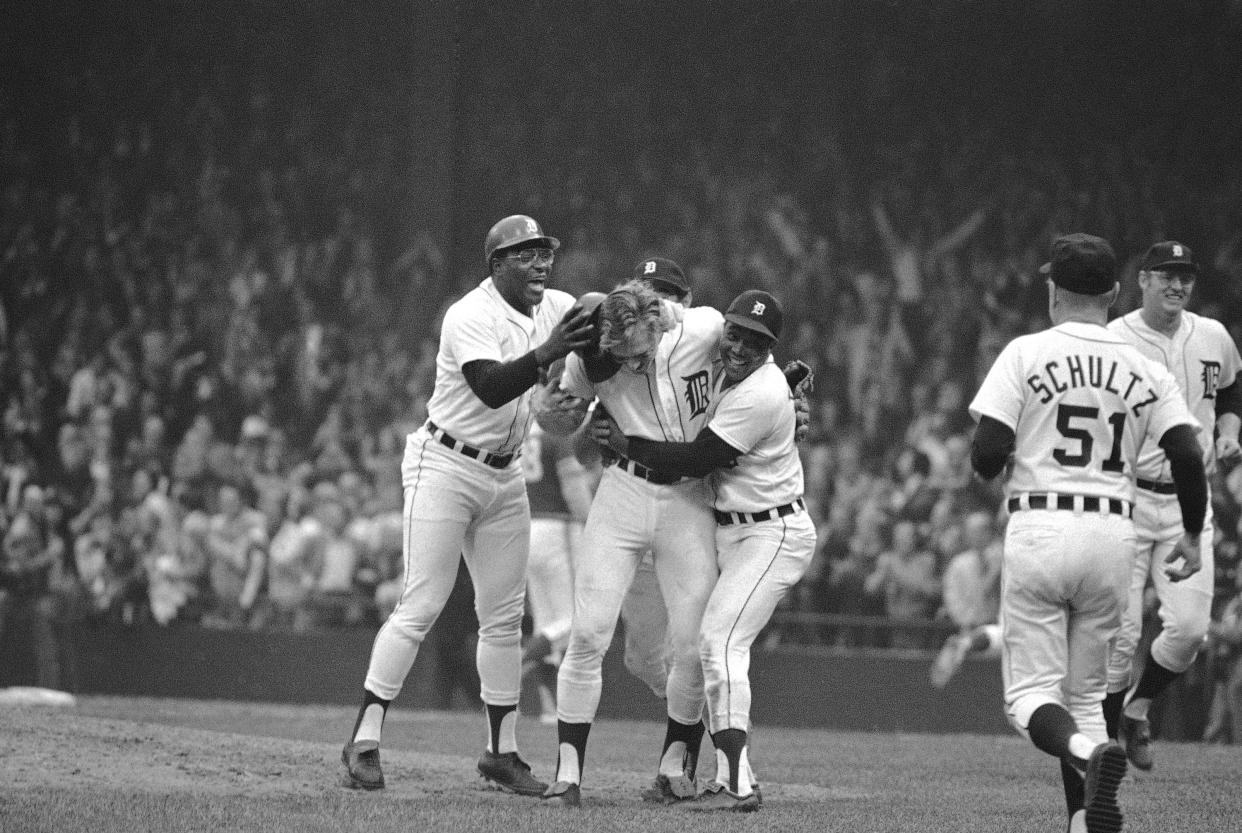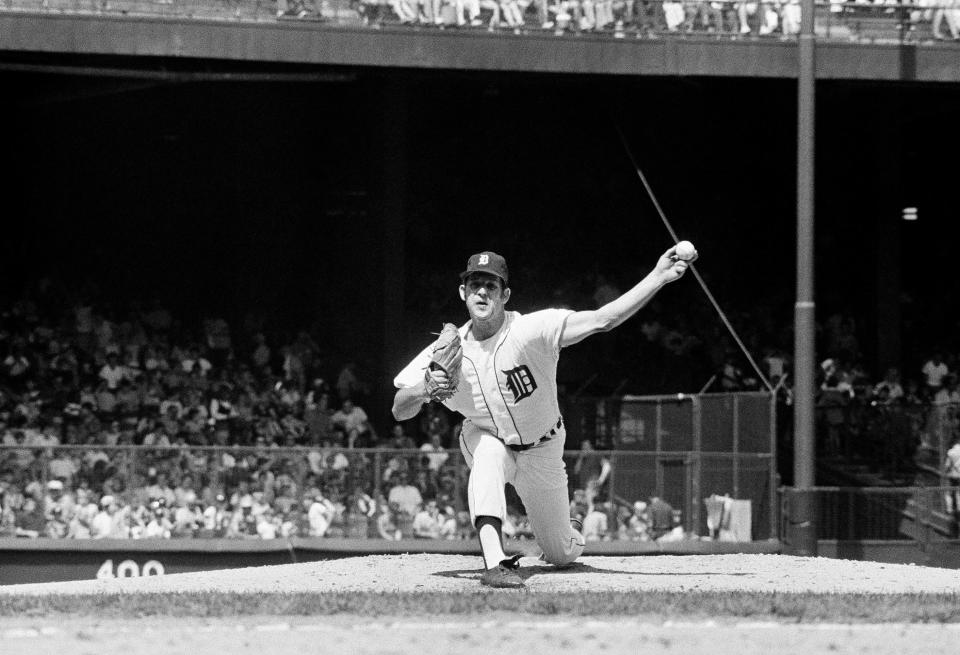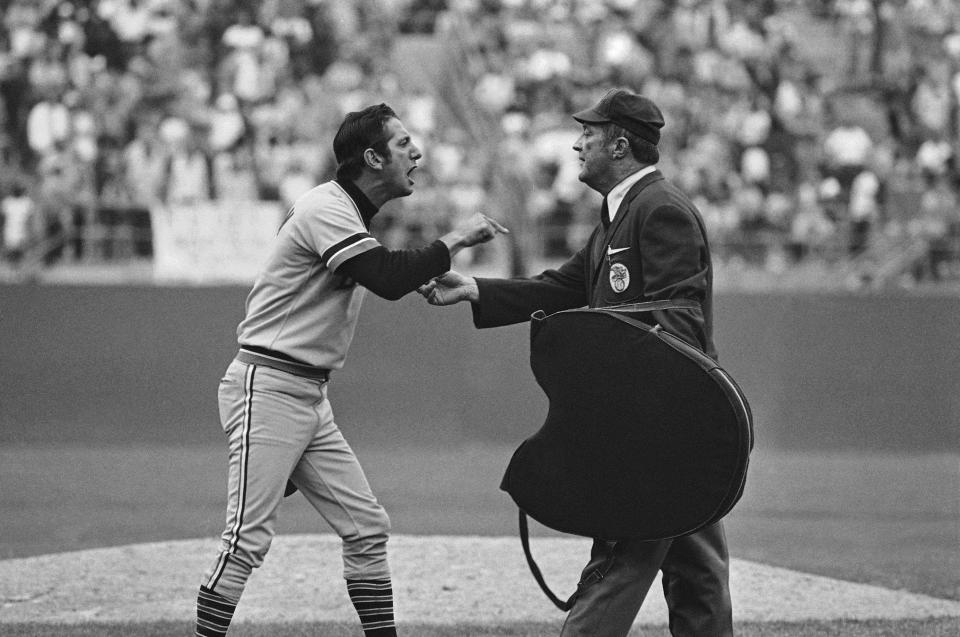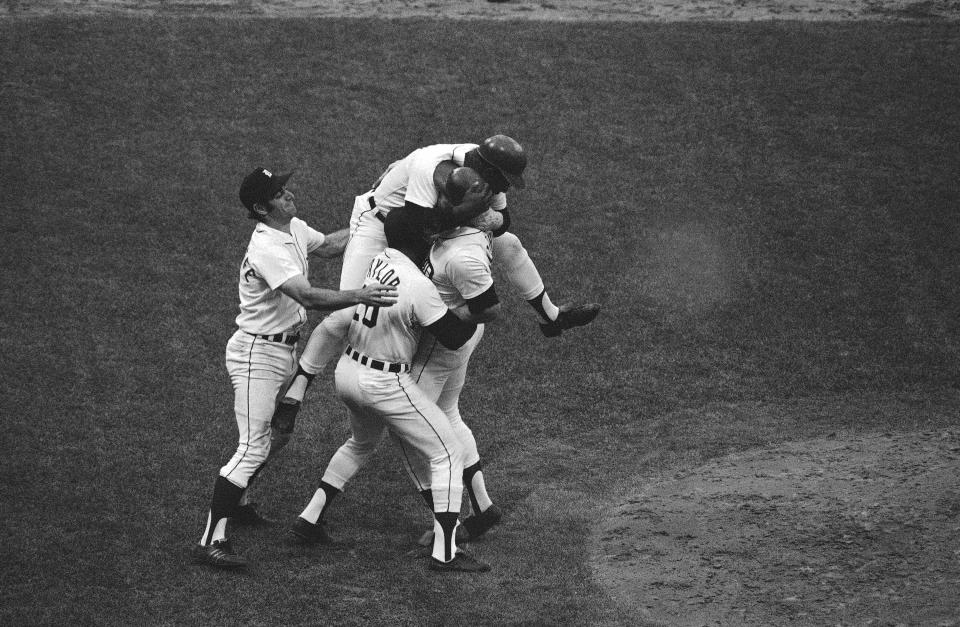50 years ago, the AL East champion Tigers had a thrill-ride of a season

- Oops!Something went wrong.Please try again later.
- Oops!Something went wrong.Please try again later.
- Oops!Something went wrong.Please try again later.
- Oops!Something went wrong.Please try again later.
- Oops!Something went wrong.Please try again later.
- Oops!Something went wrong.Please try again later.
Bedlam, brawls, Billy and one very bad call, the 1972 Detroit Tigers' season had it all.
Fifty years ago, the Tigers won the American League East pennant in dramatic fashion but were denied a trip to the World Series after dropping a riveting five-game AL Championship Series to the Oakland Athletics. It was the last American League season played before the arrival of the designated hitter rule in 1973.
The 1972 ALCS featured four one-run games, two extra-inning cliff-hangers, fans streaming over the fence and a bench-clearing brawl ignited when A’s shortstop Bert Campaneris whipped his bat over the head of Tigers pitcher Lerrin LaGrow.
But before the October thrill-ride uncorked, the ‘72 season started by stopping.
The Major League Baseball Players Association, led by executive director Marvin Miller, were demanding a 17% cost-of-living adjustment for its pension plan. The plan in place paid four-year veterans a minuscule $2,098 annually at age 45 before inching to $7,416 by their 65th birthday.
As 1972 Opening Day dates were less than a week away, spring training sites in Florida, Arizona and California were shut down and vacated, canceling the remaining exhibition games on the schedules and threatening to halt the start of the regular season.
Miller shepherded the union into a strike — the first in any professional sport — on April 1, which lasted 13 days until an agreement was reached, raising pension fund payments $500,000 and adding salary arbitration to the collective bargaining agreement.
In total, 86 games were lost on major league schedules with most teams losing between six and eight games apiece. They were never made up.
“I had a buddy of mine fly down to drive my car back to Detroit,” Tigers pitcher Tom Timmermann said. “Spring training shut down and I ended up driving him back.”
After returning to Detroit, Timmermann, now 81, said many of the Tigers players slipped over to the University of Michigan and held workouts arranged by catcher Bill Freehan, who had played baseball and football for the Wolverines.
“We couldn’t do anything formally so we did it informally. A bunch of guys did,” he said.

Billy ball arrives
The Tigers ride to the ‘72 AL East pennant was set up by the hiring of manager Billy Martin and a blockbuster trade in 1971 — which dealt two-time Cy Young Award winner Denny McLain to the Washington Senators.
Two years removed from the 1968 World Series championship, the Tigers floundered to a losing record in 1970, finishing 79-83, which led to the firing of manager Mayo Smith.
Martin, in his managerial debut, guided the Minnesota Twins to the AL West title in 1969. However, he was promptly fired following the season for a stack of reasons, which included an infamous fight with Twins pitcher David Boswell behind the Lindell AC — a renowned Detroit sports bar.
The fiery Martin turned the Tigers around, finishing second to the Orioles with a 91-71 record in 1971 despite a not-so-smooth transition from Smith.
“(Martin) was different,” said pitcher John Hiller, who suffered a heart attack in 1971. “In ‘68, we pretty much had the same lineup every day. We had four starting pitchers and they pretty much pitched every fourth day. But in ‘72, we had a mix of guys from all over the place.
“Billy would go with the hot-hand. If you were hot, he would just keep putting you out there and wear you out. He messed with his lineup a lot. Billy was Billy. He had his problems off the field, not on the field. I always thought he was innovative. Billy didn’t take guff from too many players.”

The McLain trade -— considered the best of Tigers general manager Jim Campbell’s career —- brought third baseman Aurelio Rodriguez, shortstop Ed Brinkman and 20-game winner Joe Coleman to Detroit.
“(Rodriguez and Brinkman) just locked up that side of the infield,” Timmermann said. “I was a ground-ball pitcher. And if you could get them to hit a ground ball in Detroit, you are going to win.”
The slick-fielding Brinkman, known as “Steady Eddie,” gobbled up grounders like a Ford Plant shop vac and eventually won the Gold Glove Award in ‘72.
The rocket-armed Rodriguez eventually won the AL Gold Glove Award in 1976, ending Baltimore Orioles Hall of Fame third baseman Brooks Robsinson’s record streak at 16.
“I warmed up with Rodriguez one time, and he could break your glove,” Tigers left-fielder Willie Horton said. “That was the first and last time I warmed up with him.”
Coleman went on to win 19 games in ‘72 with 2.80 ERA and added 23 wins in ‘73. Coupled with ‘68 World Series MVP Mickey Lolich, Coleman gave the Tigers a much-needed one-two punch.
“We had a good pitching staff,” Timmerman said. “We had a seasoned pitching staff and then a young pitching staff.”
Hiller, a heart of a champion
Hiller missed the entire 1971 season after suffering a heart attack at his home in Duluth, Minnesota, on Jan. 11.
“I lost a lot of weight while I was in the hospital because I got infected,” Hiller said. “When I left the hospital I was 148 (pounds). When I had the heart attack I was 212. I had no idea whether I could pitch again.
“My mindset was just give me a chance. I was fighting all the cardiologists in Michigan. None of them wanted to endorse me. In my corner was team physician Dr. (Clarence) Livingood.”
Following his heart attack, Hiller spent the first half of the 1972 season serving as a minor league pitching coach on Stubby Overmire’s staff in Lakeland.
“I was probably not the greatest pitching coach for those young guys. I was a little selfish and thinking about myself and getting in shape. I threw a lot of batting practice hoping someone would notice I could still throw the ball.”
Hiller’s weight beefed up to 165 and he was seeking help from famed cardiologist Dr. J. Willis Hurst, who was not only the president of the American Heart Association, but the personal cardiologist to former President Lyndon Johnson — which was not timely because Johnson recently suffered his fourth heart attack.
“I had two appointments with (Hurst) but both of them got canceled because of Johnson,” Hiller said. “I finally got the appointment with Dr. Hurst. After spending a day with him, he kind of winked at me and said, ‘Give me a couple of weeks, you’ll be playing.’”

The Tigers reinstated Hiller to the staff July 7. He had not faced a live batter in 18 months but Martin sent him to the mound the very next day against the Chicago White Sox, where he gave up a two-run homer to slugger Dick Allen.
“The first game I came back, Bill Freehan said I crossed him up about eight times,” Hiller said.
A few days later, Hiller sparkled in a relief stint which slotted the Tigers into sole possession of first place, and more success followed, which Hiller attributed to a new pitch he developed.
“What really changed my whole career around was my change-up,” Hiller said. “When I was coaching in Lakeland, Johnny Grodzicki taught me how to throw this change-up. It changed my career. I could throw (it) at any count and situation.”
In ‘73, Hiller won the American League ERA title with a stingy 1.44 through 125 innings and led the league with 60 games finished. He won the Sporting News Comeback Player of the Year Award and Fireman of the Year Award for the American League.
Fryman joins Tigers staff
The Tigers claimed the lefty Woodie Fryman off waivers on Aug. 2. Fryman, who had been a starter most of his previous six seasons, was the Philadelphia Phillies lone All-Star representative in 1968, but was shifted to bullpen use in 1970-71. He floundered to a 4-10 record in the first half of 1972 with a 4.60 ERA and the Phillies chucked him on waivers.
Fryman pulled an about-face after reaching Detroit, eventually finishing 10-3 with a 2.06 ERA and 72 strikeouts through 113.2 innings. His winning percentage was also tops in the American League. The Tigers slumped through the first half of August, going 5-12, however the red-hot Fryman won three of those games, which kept Detroit from tumbling in the standings.
Red Sox series
The intensity started Oct. 2 when the Boston Red Sox came to Detroit for the final three games of the season. The Red Sox were in first place, leading the Tigers by a mere half-game.
With 51,518 fans jammed into Tiger Stadium, Detroit took over first place by a half-game with a 4-1 win behind a 15-strikeout performance by Lolich.
The Tigers (86-70) won the East pennant the next day in front of a sell-out crowd, turning back the Red Sox 3-1. Fryman picked up the win, Kaline delivered a clutch RBI single and Chuck Seelback picked up the save in the ninth which sent fans streaming onto the field.
“They came into the clubhouse with a live mic,” Timmermann said. “I remember Eddie Brinkman said a bad word on live TV or radio, and we called him ‘Potty Mouth’ after that.”
Swingin’ with the A’s
The Tigers flew out to Oakland (93-52) for the first two games of the ALCS. Assembled by maverick owner Charles Finley and managed by Dick Williams, Oakland was known as the “Swingin’ A’s,” donning sold green or gold jerseys, flashy white shoes and a lineup full of players with bonus-incentive-grown mustaches.
The A’s were fast on the bases and the pitching staff was daunting with Vida Blue, Catfish Hunter, Ken Holtzman, Rollie Fingers and Blue Moon Odom.
“Oakland was up-and-coming and we were on the backside of life a little bit,” Timmermann said. “They were in their prime right there and then.”
The Tigers and Athletics were not only a clash of styles, but the two teams just didn’t like each other.
“It seemed like we had a fight with Oakland every time they came to town. It was brewing all the time. Whenever we played Oakland, we knew there was going to be an altercation of some sort,” Timmermann said.
In an 11-inning nail-biter, Oakland nipped the Tigers 3-2 in Game 1, with Fingers beating Lolich, despite a 10th inning home run by Kaline that gave the Tigers a 2-1 lead.
But an altercation didn’t occur until the seventh inning of Game 2, when LaGrow hit Campaneris in the ankle with the first pitch. Campaneris retaliated by flinging his bat at LaGrow, who ducked out of the way of its flight. The benches cleared, but no punches were thrown. However, Martin had to be restrained to keep him away from Campaneris.
“I just remember seeing Lerrin LaGrow duck. In this day and age, there might have been a huge brawl but Lerrin didn’t really react,” Hiller said. “Billy had a little bit of a temper and when it came out, he just went with it.”
Both LaGrow and Campaneris were suspended for the remainder of the Series and Oakland won 5-0 to take a 2-0 lead.
Returning to Detroit for the final three games — all day affairs — the Tigers, behind 14-strikeout complete game gem by Coleman, won 3-0 in Game 3. Ike Brown delivered a two-run single and Freehan delivered a solo home run.
Game 4 was one for the ages. Lolich and Hunter were locked in a pitching duel for eight innings with the score knotted 1-1. Oakland took a 3-1 lead in the 10th inning and appeared to be three outs away from clinching the Series.
But the Tigers rallied in the bottom of the 10th, tying the game 3-3 when Northrup stepped into the batter’s box with the bases loaded. Williams pulled the A’s outfield in anticipating a play at the plate, but Northrup belted a towering fly ball – that appeared to be a grand slam – but dropped just short of the right-field wall, scoring Gates Brown with the winning run, 4-3.
Some fans hopped the fence and rushed the field like it was the Series clincher, but it wasn’t.
“We were always taught from Tigertown up, the game is never over until the last out,” Horton said. “We believed that. They instilled that in us.”
In the deciding Game 5, with the Tigers leading 1-0 in the second, Reggie Jackson tore his hamstring sliding safely into home past Freehan on a delayed double steal. He was out for the remainder of the season but the game was knotted 1-1.
In the fourth, George Hendrick — Jackson’s replacement — grounded to shortstop but the umpire ruled McAuliffe’s throw pulled Cash off first base. Replays showed differently and a huge argument ensued.
“Norm Cash told me that was the first time he didn’t cheat at first base,” Horton said.
Hendrick eventually scored on a single by Gene Tenace and the A’s hung on to win 2-1 and head to the World Series, which began a dynasty of three consecutive World Series championships.
“That play in ‘72, I don’t think Detroit fans will ever forget that,” Horton said. “It’s been 50 years and people still remember that play.”
'72 Tigers
Pitchers — No. 38 Les Cain, 15 Joe Coleman, 45 Jim Foor, 38 Woodie Fryman, 36 Bill Gilbreth, 18 John Hiller, 20 Fred Holdsworth, 35 Mike Kilkenny, 30 Lerrin LaGrow; 48 Don Leshnock, 29 Mickey Lolich, 47 Phil Meeler, 19 Joe Niekro, 16 Ron Perranoski, 39 Fred Sherman, 37 Chuck Seelbach, 44 Bill Slayback, 46 Bob Strampe, 28 Tom Timmermann, 35 Chris Zachary.
Catchers — No. 11 Bill Freehan, 14 Tom Haller, 33 Gene Lamont, 12 Duke Sims.
Infielders — No. 8 Ed Brinkman, 25 Norm Cash, 40 John Gamble, 33 Frank Howard, 31 Paul Jata, 7 John Knox, 3 Dick McAuliffe, 4 Aurelio Rodriguez, 42 Joe Staton, 10 Tony Taylor.
Outfielders — 22 Ike Blessit, 26 Gates Brown, 9 Ike Brown, 42 Wayne Comer, 23 Willie Horton, 6 Al Kaline, 43 Marvin Lane, 5 Jim Northrup, 24 Mickey Stanley, 2 Dalton Jones.
This article originally appeared on The Ledger: 50 years ago, the AL East champion Tigers had a thrill-ride of a season
